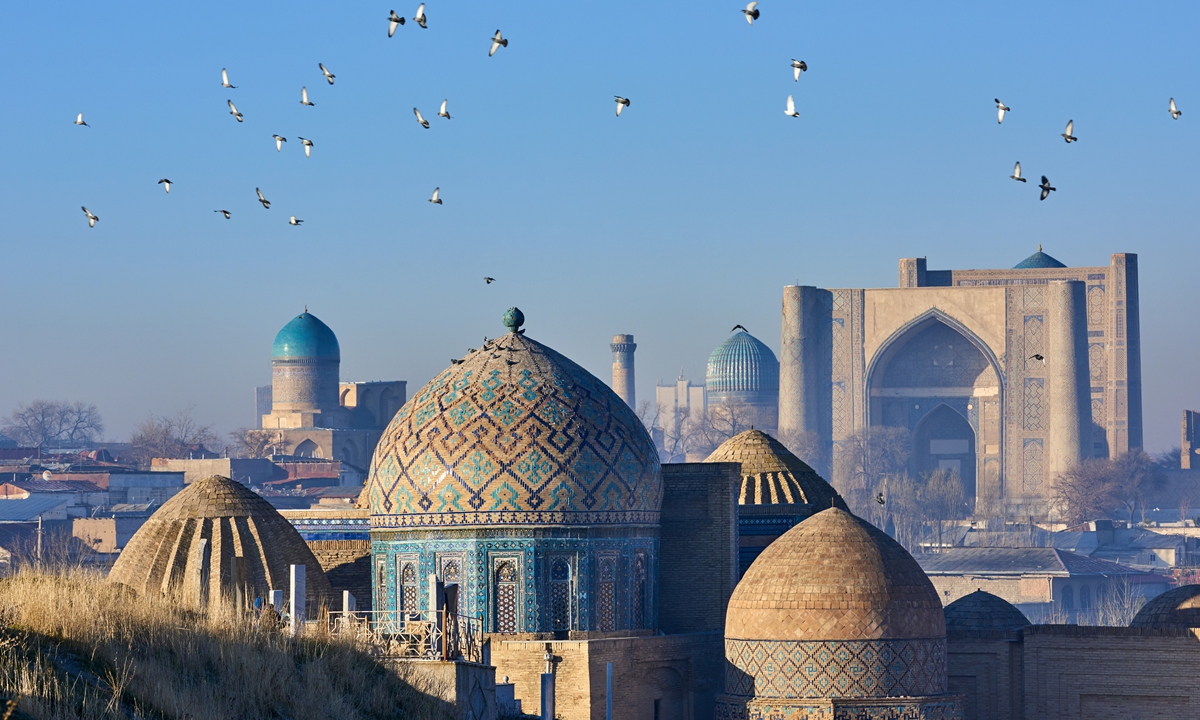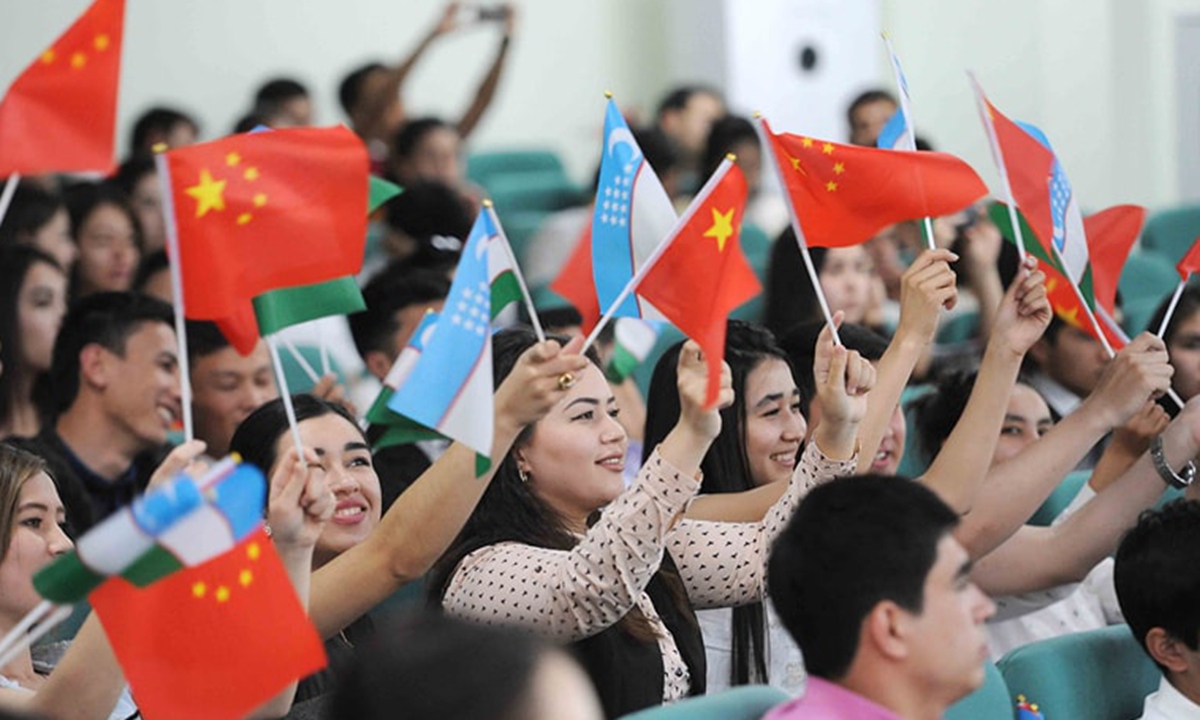Beijing will turn new glorious page in intl Olympic movement history: Uzbek diplomat
Photo: VCG Kseniya Grigoreva of Uzbekistan competes during the Vancouver 2010 Winter Olympics on February 24, 2010 in Whistler, Canada. Photo: AFP Students in Tashkent wave Chinese and Uzbek national flags during a Chinese language competition. Photo: Courtesy of Uzbek Embassy in China
Editor's Note:
This year marks the 30th anniversary of the establishment of diplomatic relations between Uzbekistan and China. The Global Times ( GT) reporters Cao Siqi and Xing Xiaojing conducted an exclusive interview with Batir Tursunov, Charge d'affaires at the Embassy of Uzbekistan to China, who spoke highly of the improvement of bilateral relations over the past few years with corroborated facts and data, and the belief that Beijing, the first city to host both the Summer and Winter Olympic Games, will host the Games excellently and turn a new glorious page in the history of the international Olympic movement despite difficulties brought about by the COVID-19.
GT: This year marks the 30th anniversary of the establishment of diplomatic relations between China and Uzbekistan. How do you assess the success of the two countries in the development of bilateral cooperation during this period?
Batir Tursunov: January 2 officially marked the 30th anniversary of the establishment of diplomatic relations between Uzbekistan and China. During this short historical period, the bilateral relations between our countries have acquired the character of a comprehensive strategic partnership based on the principles of friendship, trust, and mutual support. In recent years, we have seen highly dynamic and multifaceted cooperation in virtually all areas, such as trade, investment, energy, transport, communication, cultural and humanitarian exchanges, and tourism among others.
During the China-Central Asia summit held on January 25, the leaders of Uzbekistan and China reiterated their determination to further strengthening the relations of comprehensive strategic partnership, developing cooperation both on a bilateral basis and within the framework of the Belt and Road initiative, and the SCO in relevant areas. Among them are electronic commerce and digital logistics, "green" technologies, alternative energy, innovation, the fight against COVID-19, and many more.
The Joint Statement adopted at the end of this meeting marked the beginning of a historical new stage of relations between our countries. The successes in the intensification of economic cooperation between our countries deserve special attention.
Batir Tursunov: China already has extensive experience in hosting sports events at this scale. The 2008 Beijing Summer Olympic Games remains in the history of the Olympic movement as the most grandiose sporting event organized spectacularly.
Now Beijing is set to host the Winter Games. It is noteworthy that Beijing will be the first city to host both the Summer and Winter Olympic Games. We are convinced that the current Games in Beijing, despite the difficult conditions brought about by the COVID-19 pandemic, will be held excellently and will turn a new glorious page in the history of the international Olympic movement.
GT: What can you say about the development of winter sports in Uzbekistan? What are your expectations regarding the participation of your athletes in the Beijing Winter Olympic Games?
Batir Tursunov: This is not the first time Uzbekistan will be participating in the Winter Olympic Games. Uzbekistan will, at the upcoming Winter Olympics in Beijing, be dedicated to one discipline- alpine skiing (the slalom and giant slalom tournaments).
However, Uzbek athletes are traditionally stronger in summer sports. This is due to shorter winters in Uzbekistan, and low precipitation. This prevents our athletes from regularly engaging in winter sports, including downhill skiing.
In recent years, interest, especially among young people, in winter sports has grown significantly. This has been facilitated by measures taken by the Government to create the necessary opportunities.
It should be noted that China has experience both in organizing and participating in winter competitions. In this regard, we continue to maintain close ties and cooperation with relevant Chinese bodies. In particular, in 2020, the Uzbek National Olympic Committee and the Chinese Olympic Committee signed a memorandum of mutual cooperation. On the basis of this memorandum, both parties agreed to work on joint training camps to boost trainers'' experience aided by experienced nutritionists and other relevant experts. 
GT: Uzbekistan has assumed the 2021-2022 SCO Chairmanship. What are the main goals during of your country's tenure?
Batir Tursunov: Uzbekistan, along with other SCO states, has significantly contributed to the institutional formation of the organization. The SCO has two permanent bodies, the Secretariat in Beijing and the Regional Anti-Terrorist Structure in Tashkent.
In recent years, Uzbekistan has noticeably increased participation in SCO activities. During its tenure in 2022, Uzbekistan proposes prioritize the development of a Joint Action Plan to develop SEO trade, preparing and adopting an SCO Industrial Cooperation Program, adopting an SCO Strategy to develop transport connectivity, cooperation to reduce poverty and increase food security, intensifying efforts to ensure peace and stability, establishing an information security forum, developing "people's diplomacy" and cooperation between the regions of our countries, strengthening cooperation in healthcare, and enhancing member countries' and partners, dialogue and active involvement in implementing SCO projects of mutual interest. We are confident that these initiatives will further grow the organization's potential in solving common, urgent tasks within the SCO space.
GT: Could you tell us about the Uzbek national strategy development? What points of contact between the national development strategy and the Belt and Road initiative (BRI) can you identify?
Batir Tursunov: At the beginning of 2017, the Strategy of Actions on Five Priority Areas of Development of the Republic of Uzbekistan for 2017-2021 was adopted, which defined the country's strategic objectives for the coming years.
The program identified five priority areas covering all spheres of the country's management. The main goals were to deepen democratic reforms, ensure peace, stability, and tranquillity, strengthen economic power, and create decent living conditions.
Thanks to the successful implementation of the goals specified in the Strategy, significant results have been achieved in improving state and social integrity, ensuring the rule of law and further reforming the judicial and legal system, developing and liberalizing the economy and the social sphere, safeguarding security, interethnic harmony, and religious tolerance, and implementing a balanced, mutually beneficial, and constructive foreign policy.
Uzbekistan and China have accumulated significant experience in cooperation within the framework of the BRI. It is noteworthy that both Uzbekistan and China attach special importance to the issue of transport and economic interconnectedness.
In particular, special attention is focused on projects for the development of transport and logistics potential, modernizing the agro-industrial complex, energy, tourism industry, a "green economy," and in introducing technologies and innovations.
An important area of cooperation is exploring the transit potential of the Central Asian region and forming the China-Central Asia-West Asia economic corridor. The Uzbekistan-Kyrgyzstan-China railway construction project is gaining strategic importance. The Uzbek side also considers it economically feasible to establish a through tariff for rail transportation along the routes in the "One Belt, One Road" project passing through the Central Asian region.
GT: As you know, the number of students from Uzbekistan studying in China has increased significantly in recent years. Could you share your assessments regarding the current state of youth exchanges between China and Uzbekistan?
Batir Tursunov: It is no coincidence that Uzbekistan and China, countries with a rich historical, cultural, spiritual, and intellectual heritage, rely on young people, thereby opening up a new space for mutually beneficial cooperation.
Significant results have been achieved in this orientation. Thousands of Uzbek students study at prestigious universities in China, where they receive education in the most popular specialties. The interest among Uzbek youth in learning Chinese is increasing from year to year. This reflects the trend of active practical cooperation between Uzbekistan and China in virtually all spheres and orientations.
The Confucius Institutes at the Tashkent State University of Oriental Studies and the Samarkand State Institute of Foreign Languages make important contributions to this process. I would like to emphasize the fact that the Confucius Institute in Tashkent, which was opened in Uzbekistan in 2004, became the first such institution in the world.
Partnerships between leading universities in the two countries are being strengthened. Student exchanges are provided and conferences and seminars are held on topical issues of bilateral cooperation. Moreover, thousands of Uzbek youth representatives receive education at universities in China in the most popular fields and disciplines.
Uzbekistan is ready for further fruitful cooperation with China, both within a bilateral framework and within the framework of international structures, including the SCO, to strengthen cooperation between public youth organizations, as well as the implementation of initiatives to enhance youth dialogue.
Sidebar ▶ Cooperation between China, Uzbekistan
•China is the largest export market for Uzbek goods
Before the pandemic, the annual volume of bilateral trade increased by an average of 30-40%, according to data from the Uzbek Embassy in China.
By the end of 2021, trade exceeded $7.4 billion. In 2021, China's share in Uzbekistan's total foreign trade amounted to 17.7%, according to data from the Uzbek Embassy in China.
The annual growth of Chinese investments in Uzbekistan ranges from 40-50%, according to data from the Uzbek Embassy in China.
China's direct investments in the Uzbek economy cover oil and gas, chemical, construction materials production, pharmaceuticals, the agricultural sector, energy industry and others.
•Joint production of the Uzbek-Chinese vaccine
China-developed COVID-19 vaccine was officially approved for public use in Uzbekistan in March 2021, becoming the world's first recombinant subunit vaccine to be officially registered.
The vaccine is locally produced, guaranteeing constant supply.
•Poverty reduction a new area of practical cooperation
In 8 years, the entire impoverished rural population in Uzbekistan has been elevated from poverty, totaling to about 100 million people, partly from cooperation with China in the development of rural industries, the modernization of the agricultural sector, and the strengthening of rural infrastructure.
_________
International New Media Federation
Asia Pacific Chinese Television
Sri Lanka International Television
Nordic International News Center
Next: " Celebrate Chinese festivity During the Incredible Lantern Festival." 2022 Global Oversea
Related Reading
- GT investigates: From Guantanamo Bay to local prisons, human rights violations are pervasive in US j
- UN appeals to support Palestinian refugees
- Harvard, Columbia, Yale and other students want the school to divest from companies doing business w
- Google announces layoffs, transfers to cut costs
- Forest City's Symbiotic Journey with Nature: Passionate about Construction, Committed to Conser
- Beijing will turn new glorious page in intl Olympic movement history: Uzbek diplomat
- China willing to offer assistance to tsunami-hit Tonga
- International Horticultural Exhibition 2024 Chengdu Appears at Chongqing Chrysanthemum Exhibition
- Malaysia’s mangrove-planting fishermen stumble across nature finance hurdle
- Malaysian island spearheads green palm oil revolution

